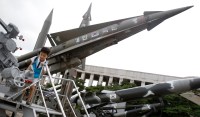
Couldn't afford the upkeep, so it's yours now, kid!
It’s interesting to think back to the start of the global economic crisis, when there were a lot of assumptions voiced about how a rising quotient of international tension would inevitably morph into more conflicts and thus more traditionally focused defense spending – i.e., great powers hedging against one another versus, say, non-state actors or state failure. If we were on the verge of the second Great Depression, then certainly we’d find ourselves in a 1930s-like march toward significant great-power struggles, yes? With the Arab Spring providing the tinder for a great-power free-for-all?
So what have we found so far?
With regard to the Arab Spring, the great power response has been carefully muted – to say the least. Even with NATO’s involvement in Libya, no one is talking about the potential for wider conflagration because there doesn’t seem to be any. Outside of the Middle East, we spot some muscle flexing by those “rising” Chinese, which has led to a rapid uptick in defense imports by its regional neighbors over the past half decade But that dynamic, worrisome though it be, tracked fairly well with the overall global rise in defense exports. From 2005 to 2007, or the height of the boom/bubble, global defense exports jumped by half, or from roughly $40 billion to $60 billion.
At that point, according to the logic of great-power war pessimists, we should have seen nervous governments the world over jack up defense purchases in response to the global crash. Instead, global defense exports, which are an excellent proxy measure of great and regional power nerves, have tracked with the subsequent gyrations of the global economy to a stunning degree (see the 19 Aug FT story: “Markets downbeat on outlook for defence”):
- The 2008 crash triggered a drop of approximately one quarter ($60B to $45B);
- Then the relatively quick recovery in 2009 pushed spending back up to almost $65B;
- Only to see the bottom of the market drop out again in 2010, as exports plunged to just over $40B.
In sum, the recent boom in global defense exports was fueled by the unsustainable global financial bubble. Once it popped, so too did the defense spending. We haven’t been living in a more dangerous world across the 2000s. We were simply living in a world where it was easier for great powers to spend more on defense – until it wasn’t.
The outlook ahead? Fairly dire for externally oriented defense spending. If anything, the Arab Spring has sparked the market for internal security. Figures released recently by China, for example, suggest that the rising power now spends more on its internal police than its military.
So rather than looking at World War III, we seem to be heading into a rather prolonged hunkering down period for great powers, with a continued focused on trans- and subnational threats vice traditional inter-state ones. Yes, plenty of US security analysts may be excited about China’s new “training wheels” carrier, but that platform is only so useful when it comes to street riots in Xinjiang province – or civil wars in oil-exporting nations, for that matter.
All in all, these defense spending trends remind me of the analysis on recent Asian eating habits, which, thanks to rising incomes, had been trending toward a more Western diet prior to the crash. In past crashes, such cultural shifts were typically reversed, as people moved back to cheaper foodstuffs that they know. But this time it didn’t happen. Consumers simply stuck to their new path – individualism winning out over nationalism.
The same thing seems to be happening with great powers on defense priorities: by and large they’re sticking to the general shift toward non-traditional security issues, despite our alleged resurrection of 1930s-style dynamics across the global system. That tells me two things: 1) nuclear weapons really did kill great-power war for good; and 2) American-style or modern globalization really did transform the global security landscape – for the better.
And on that basis, I vote for continuing with each.


